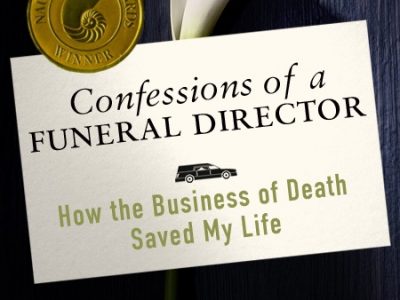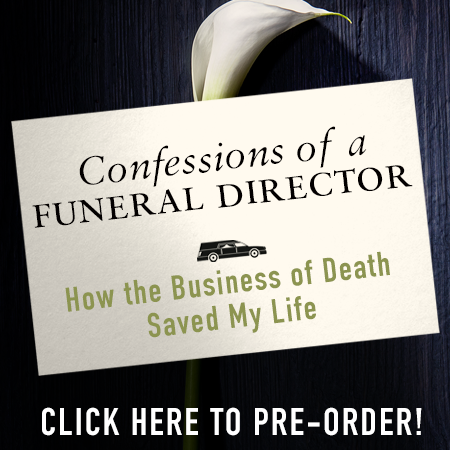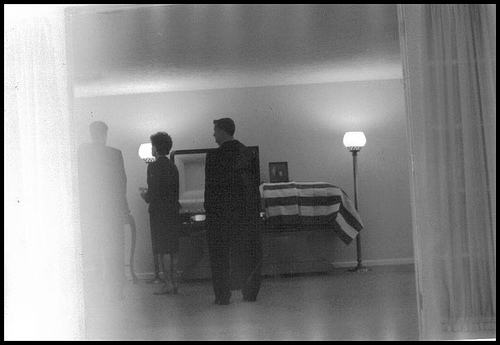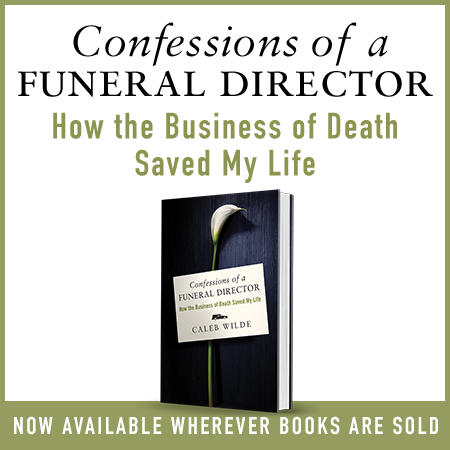10 Pieces of Advice for Picking Up a Dead Body
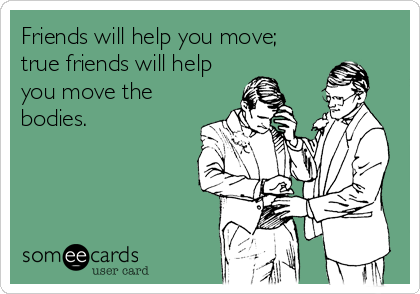
Over the course of my career as a funeral director, there have been a handful of times when I’ve had to call on my friends to help me with a removal. All but one of my friends have answered my call with a, “Yes, I’ll help you.” Driving to the deceased’s home provided me with just enough time to go over the basics of a house removal. So, if a funeral director friend ever asks you to go on a house-call, here’s the advice I always give my buddies.
One. Never, ever rush the family.
I always tell the family, “You have as much time as you need.” Permission is so key. But word’s aren’t enough. Your body language has to say the same thing. So, if the family is waiting on a relative to arrive from an hour away, or if they just need an extra half an hour with the deceased, take a deep breath, relax, find a seat on the sofa, and let grief run its course.
Two. Always do a dry run first.
You got to do some reconnaissance before you make the actual removal. The deceased could be on the third floor of the attic. They could be sitting on the toilet, bent in half and hard as a rock from rigor mortis. They could be in the basement slumped over in their recliner. Usually, they’re under hospice care, in an easy to access bed, but it always helps to know what you’re getting into before you get into it.
Three. Give the family permission to be there while you make the transfer
Families rarely want to watch you make the transfer of the body onto the stretcher, but sometimes they not only want to be there and watch, they want to help. And for that 10% that want to be part of the transfer, it means the world to them if you invite them. I usually say, “you’ve loved and cared for them up to this point, so don’t stop now.”
Four. DON’T EVER COMMENT ON THE BODY
Unless you’re saying something affectionate and empathetic, I don’t care if the deceased’s body has three breasts and two heads, this isn’t time for commentary. You don’t comment on the smell, on the weight, on the funny look on the deceased’s face. Maybe it’s obvious that the deceased died during coitus, just keep your smiles to yourself and your words in your head. I know this is an obvious piece of advice, but when we get around awkward situations, some people attempt to cope by stating the obvious.
Five. When you’re going to lift the deceased onto the stretcher, don’t grab them under the ass.
Or you’ll get poop on your hands or gloves.
Six. MAKE SURE THE STRETCHER CLICKS!!!
When you raise the stretcher into the upright position, you’ll hear a little “click” sound which means it has locked in place. If you don’t hear the click, bodies be dropping.
Seven. If you drop the body, don’t curse.
We all make mistakes. God forbid your mistake is a dropped body, but if you do, don’t yell, “shit”, or “penis waffle” or “tater tits”.
Eight. If the family is leery of seeing their loved one being carted out, let them know you’re coming.
Some families don’t want to see or hear any bit of the transfer process. If you’re dealing with this type of family, let them know that you’re about to come through the house so that they can go to another room if they wish.
Nine. Make sure your cell phone is off.
Funeral directors think it’s cute to have their ringer set to the song “Another One Bites the Dust” or “Highway to Hell”. And that’s fine unless your ringer goes off as your carting Grandma through the house on a removal.
Ten. Drive away slowly from the house.
I’ve had a number of families tell me, “I really liked it when you drove off slowly.” Hearses have massive engines and they tend to be rear wheel drive, which means massive donut and burnout potential. But donuts after a successful removal? Probably not the best way to end your day.
On my blog, I generally write fun little posts like the one you just read. But, if you’re interested in the stories of death care, here’s my book:
10 Terrifying Things About Funeral Homes You Didn’t Know: A Response
Answers.com recently unpublished an article entitled “10 Terrifying Things About Funeral Homes You Didn’t Know”. Although I appreciate attempts to talk about death and funerals (and I do appreciate the fact that they took the article down), the sensationalized “answers” in the article, which I put in quotation boxes, are much more concerned about garnering internet views, and subsequently, the money that comes with those views, then they are about the quality of their answers. Sensationalizing facts on the internet is nothing new, but when you damn the funeral industry for exploiting the masses and you’re hypocritically attempting to do the same with a sensationalized article, you need to be called out.
Here are their “10 Terrifying Things” from the Answers.com article and my responses.
1. Death is Big Business: Pardon the pun, but funeral homes make a killing. The caskets in funeral homes are set up to where the grieving family members see the most expensive caskets. It’s a billion dollar industry, and bigger funeral service providers will attempt to acquire every aspect of the business, such as florists and tombstone engravers.
There’s a lot of billion dollar industries. Fantasy football is a 70 billion dollar industry. Video games. Cigarettes. Shoes. Starbucks Coffee.
In fact, you’d expect the funeral industry to be a billion dollar industry because unlike Cigarettes, everybody eventually needs death care. The worth of industry isn’t the determining factor if the industry is making “a killing.” Rather, the gross profit margin and net profit margin are the numbers we should be concerned about. In 2016, Dunkin Donuts’ gross profit margin was 82.07%, meaning that for every dollar spent at Dunkin Donuts, 82 cents was gross profit, which you’d expect for something as cheap to produce as coffee. The net profit margin is the more accurate way to measure a company’s health as it takes into account the whole of the company’s expenditures. For Dunkin Donuts, the net profit margin in 2016 was 23.60%.
The funeral industry isn’t nearly as measurable as Dunkin Donuts, but here are some rough estimates from 2010: The gross profit margin was 62.5%, which ranked about middle of the road for similar service industries. But, many of us independent funeral homes had around 10 to 30% gross profit margin. My guess would be that corporate funeral homes drive up the overall GPM for the industry. From some stats I found (again, this isn’t measurable like Dunkin Donuts), the net profit margin hovers around 10.70%.
In other words, even if those numbers I used aren’t entirely accurate, it’s very hard to argue that the funeral industry is making a killing.
2. They Take Advantage: People in grief are extremely vulnerable, and some funeral service providers are not above taking advantage of that. A funeral director can easily steer families in the direction of more expensive flowers or coffins. At the time, it seems like a showy, elaborate funeral is the only way to honor the deceased.
For those of us funeral directors who are ultimately concerned about service, the idea that we’re “taking advantage” of our customers frankly pisses us off.
It’s like assuming that all Catholic priests are pedophiles.
Or that all Matthew McConaughey movies involve shirt removal (he keeps his shirt on in Interstellar)
Answers.com is making a blanket statement that simply doesn’t cover us all. In fact, it’s these blanket statements like this that incite some anger in those of us who find joy in helping those in their greatest hour of need and confusion. For the good funeral directors, our joy is helping you, not exploiting you.
And while I can say that many — if not most — in this industry exist for service, there is the dark side — those few — that do as Answers.com describes.
3. Are You Dead or Just Happy to See Me? When the body begins to decompose, certain areas known to have heavy concentrations of bacteria often swell to more than twice their normal size. Undertakers have to work fast to drain the bodies of all fluids, and they pack all of the body’s openings with cotton to prevent leakage.
If you want embalming, then yes, we do drain the body’s fluids. And we usually pack the nose with cotton to keep any liquids from running down the face during a viewing. If we take out the sensationalism, this one is mostly true.
4. Broken Parts: Funeral home employees are masters in the art of restoration. They often have to make a body presentable for viewing, despite how the person died. Sometimes, it’s as simple as using cosmetics to cover minor scrapes or bruises, but other times, morticians have to stitch bodies back together.
Answers.com got this right. Although I’m not sure this qualifies as “terrifying”. Bwahahaha. I’ll put makeup on your face. Bwahahah. Let me trim your beard. Look at me, I’m a master of restoration and I’m TERRIFYING.
5. Embalming: Everyone knows that embalming is the process of removing all the fluids from a body and replacing them with preservatives. What happens to all those fluids from the body? They go right into the public sewage system. That’s what’s really running through your pipes.
Right again, but when you think about the other things that get poured down the drawn (various chemicals, condoms, and menstrual flow), it’s not entirely terrifying.
6. The Eyes Have It: A person’s eyes are not usually removed from the body when its embalmed. They do start to flatten out, so morticians usually place a cap underneath the eyelid so that it still looks curved, or they’ll re-fill the eye to its normal size.
ZZZZZzzzzzz. Eye caps. Yes, we use eye caps. No, we don’t remove eyes.
7. They May Not Be Doing Their Jobs: In 2002, it was discovered that the Tri-State Crematory had been scattering the bodies rather than properly cremating them. Over 300 hundred bodies were discovered on the crematory’s property. It was revealed that the crematory had been giving the families concrete dust instead of ashes. Some of the bodies were never identified due to body decomposition.
Sadly, this one is true. Tri-State Crematory did do just as they say.
8. Please Wait Outside: When funeral directors have to go into someone’s home to retrieve a body, they are often in a hurry. The grieving family naturally wants time to say goodbye, but family members can hinder the work of funeral directors.
If you EVER feel any type of pressure from a funeral home or funeral director FIRE THEM! Seriously, just fire them. The fact is that your mind is already clouded by grief and the last thing you need in your life is someone trying to push you around. You just experienced a death in your life. You need people who will give you the time and space you need, NOT people who want to push you around.
And, no, we are not “OFTEN IN A HURRY.” Do you really think a funeral home would survive in a community if we’re always in a hurry? No. We wouldn’t. Most of us treat families like they are our own family.
9. Drops Happen: Sometimes, dropping the body is unavoidable. Removing bodies of overweight people from five-story buildings, for example, can prove to be quite tricky. Hopefully if it happens, it doesn’t occur in the eyes of the family.
Yes, drops do happen. I’ve handled a few thousand deceased persons and I’ve never dropped one. But, it might happen. I hope it doesn’t.
10. Caskets Don’t Have to Be Expensive: Caskets are where funeral homes make a lot of their money — the average price of a casket is over $1000. However, a nice casket can be bought between $400 – 600. You just have to shop around. A decent service for your loved one doesn’t have to put you in debt.
Casket’s don’t have to be expensive and many funeral homes do mark up their caskets, BUT I’m not sure a “nice” casket can be bought between $400 to $600. WalMart sells caskets, but not one of them is under $1,000. We sell a couple caskets for under $1,000. So, yeah. I don’t know where they came up with that $400 to $600 price range unless you simply want a cardboard box (which is totally cool if you do).
If you want to read about why I’m a funeral director (and it has little to do with money), you can buy my words.
10 Things Funeral Directors Love
One. Short Graveside Services on Extremely Hot or Extremely Cold Days
Sweat rolling down your back and into your underwear while you bake in the sun for a 45-minute graveside service is almost as equally painful as losing the feeling in your toes and fingers while you do the same in the winter. Funeral directors — and families for that matter — love short graveside service in either temperature extremes.
Two. When the family say, “Mom hasn’t looked this good in 20 years”
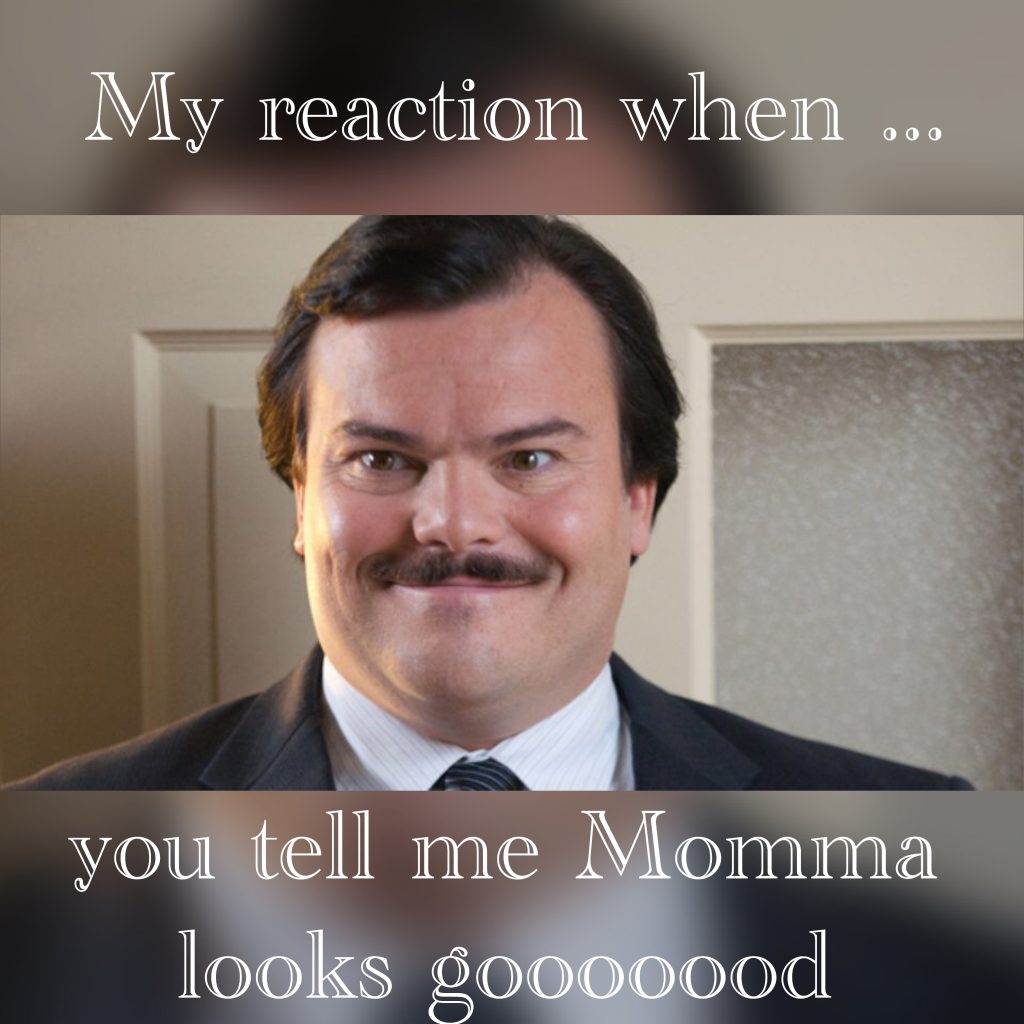
Three. Burial Dresses that are funeral appropriate
The lost and found bin at a dance club is not an appropriate place to get grandma’s funeral clothing. It’s awkward. For all of us. But when you bring in a lovely dress or nightgown that screams “I WAS MADE FOR A FUNERAL” it makes our job so much easier.
Four. When those arteries and veins pop right out like they’ve been waiting for you
There are times when you go to embalm and it’s almost like the deceased telepathically moved their carotid artery and jugular vein right where you need them to be.
Five. “Why yes, here’s the death certificate. And it’s already signed.”
For those funeral directors that work in states where eSignatures haven’t totally caught on, a signed death certificate can literally save us hours of sitting and waiting. A signed death certificate can often be the difference between us seeing our son’s baseball game and not seeing it.
Six. Those times you have a house call on the third floor of the apartment building and the deceased only weights 100lbs.
As funeral directors, we honor everybody and every body, but there are times when our backs really appreciate it when 100lbs is all we have to carry down a couple flights of stairs.
Seven. When the family of the deceased actually love each other.
This is the best. In fact, just now I finished meeting with a blended family where everyone loved each other. No one was fighting and nitpicking about this and that. They were being genuinely generous and empathetic to each other’s wishes. It’s a breath of fresh air.
Eight. That time at the cemetery when everyone takes a shot of Jack and says to you, “Dad would be offended if you didn’t partake.”
Yesssssss, pleeeaaaassssse.
Nine. Families that prearrange and prepay their funeral.
The longer I’m in the business, the more difficult it is for me to convince people to not become funeral poor. Funeral poor is simply when a family spends too much money on things they can’t afford. The difficulty is usually this: when a young person dies from an accident or a drug overdose, there’s usually very little funds available, but because the death was ugly, the family wants the last goodbye to be extra beautiful. When a family has prepaid, or pre arranged the funeral and everything has already been chosen and everything has already been paid for, it makes the whole process so streamlined and easy for both us and the family.
Ten. Sloppy kisses and extra long hugs.
When I was young in the funeral business, I’d often shy away from hugs and kisses. As I’ve grown older, there are few things I love more than a hug and a sloppy kiss from someone at a funeral.
If you like hugs, this book is a 200-page hug from me, and Death, to you A 200-page hug is a really long hug, so if you’re gonna buy it, things will probably get a little sweaty, so wear clothing that is breathable. XOXO
10 Things Funeral Directors Hate
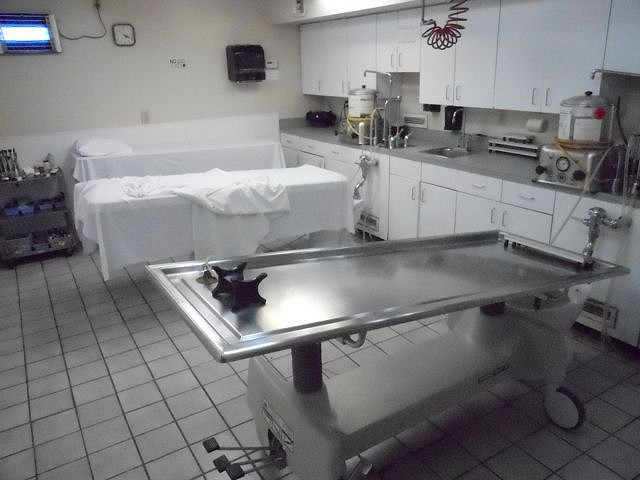
Photographer URL: https://www.flickr.com/people/63239698@N05/
Title: Autopsy Table
Some of these 10 things are things that I hate. Some are things that are universally hated (i.e. tissue gas) by those of us in funeral homes. While others are things that industry funeral directors love to hate (and when I use the term “industry funeral director” I’m talking about the sycophantic, uptight company men and women of “the industry”).
One. Tissue Gas:
I’m not sure if “hatred” is a strong enough word for how we feel about tissue gas (aka Clostridium perfringens). It usually ruins a body, it can sometimes run the other bodies in the morgue, and it can even ruin future bodies that come into our morgue. Tissue gas results from an organism that duplicates itself every six minutes, causing a normal dead body to totally change in a matter of hours. Tissue gas is so contagious that if it gets on our embalming instruments, it will spread to the other bodies. It’s like the movie Outbreak but in a morgue. And once it takes over, we pray for a cure, but that prayer is rarely answered.
Two. The Heroin Epidemic:
I wrote about this hatred early last week. Here’s the link if you want to read about how much I absolutely HATE heroin.
Three. Medical Examiners that Short Cut Arteries
Grrr. Just a little bit of generosity with your cuts! We’re not trimming weeds, or plucking eyebrows here. You don’t have to make those arteries as short as possible. Give us something to work with so we can embalm your autopsied body.
Four. Accidently Slicing a Vein while Raising the Carotid and Jugular:
There’s nothing that I hate more than accidentally nicking an artery or vein when I’m raising the carotid artery or jugular vein. It’s hard enough to raise the carotid and the jugular without blood seeping up from the netherworld of the neck and having to fish around blindly in the red and sinew to find what you’re looking for.
Five. Cheats:
More and more funeral homes are expecting payment up front. There’s reason for this up-front payment policy. We’ve been beaten by past clients on numerous occasions. We’ve been beaten by families who come in and say, “We have a $30,000 life insurance policy, and we only want the best. Because Dad deserves the best.” They sweet talk us, swindle us, they buy our best casket, purchase a couple plots “for the whole family” at the cemetery, they buy the best vault, write a huge obituary and put it in five different newspapers. Two months and $16,000 later and we see the family driving around town in new cars, having used all that $30,000 and bounced on the $16,000 funeral bill.
Obviously, we hate being cheated, but we also hate the broken trust.
Six. Corpse Vomit:
AHHHHH. There have been a couple times when I’ve gotten turned around on a removal and gone down the stairs with the deceased’s head facing down. If there are any remains of yesterday’s lunch, there’s a good chance that lunch is gonna come seeping out of their mouth and onto us. There are few things that are more deserving of a “Dirty Jobs” episode than handling vomiting corpses.
Seven. Casketed Purges:
This falls into the “so annoying, I hate it” category. You can aspirate all the cavities multiple times and still, on the very day of the viewing, the deceased decides to leak a little purge out of their mouth and onto the casket pillow. Grrr.
Eight. Bad Funeral Directors:
There’s nothing industry funeral directors love to hate more than “funeral directors who give the industry a bad name”. Funeral directors too often suffer from enlarged egos and self-aggrandized views of their own ethical standards, so when someone in the industry messes up, we love to hate them so we can feel distinguished from the bad guys. The bad guys act like the scapegoats to cover our own sins, hiding the fact that most of us in the industry could do better for our customers.
Nine. Criticism:
Jessica Mitford caused a lot of butthurt in the funeral industry and here’s the short answer to “why”.
Families come to us in despair, their minds clouded by grief and the unknown. They pay us to be the stable minds. And they give us power. They give us power every time they trust us with their deceased loved one and their grief. And when they give us that power, there’s a certain satisfaction that comes with treating that vulnerability with as much honor as we can.
But sometimes that power can bloat our egos. And bloated egos absolutely abhor criticism, even when it was warranted like Mitford’s.
Ten. Funeral Directors that are Transparent
Industry funeral directors often have invisible standards of “professionalism” and anyone that falls outside those standards is a “POS” or “bitch” (terms that I’ve been called on a couple occasions by the industry yard barkers). Anytime funeral directors write about our work with a degree of transparency and honesty, that stirs the feathers of the industry funeral directors.
In fact, I fully expect my book will do just that. If you want an insider perspective on the industry that’s equal parts personal, honest and transparent, buy my words:
Three Stories of Funeral Drama
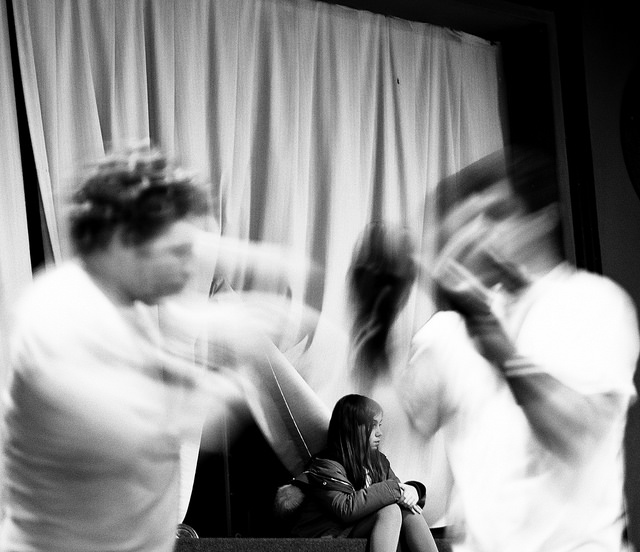
Author: pedro alves
Author URL: https://www.flickr.com/people/sevlaordep/
Funerals are the perfect storm for drama. Death brings out all sorts of emotions and because we’re not used to emotions like grief, it’s more difficult to control our emotions as a whole. You might say things that they’ve been thinking for years, like telling your brother, “You’re so rich, YOU should pay for dad’s funeral bill” or “I was always Mom’s favorite so I get to make these decisions.”
If a soap opera really wanted to create a ripe context for daytime television, they’d write a show for a funeral home and call it “General Funeral Home” or “Days of Our Deaths” or “The Dead and the Rest in Peace”. Here are three stories of funeral drama that I’ve seen:
The Drunk: Some people see funerals as a stage, a stage where they can shine. I probably have a hundred attention grabber stories, but one star stands out brighter than them all. A couple years ago, we buried a man in his sixties who had little life connections except a couple friends and a couple sisters. The family decided to have a graveside service at a small cemetery on top of a little hill in a neighboring town.
All was going well until some friends showed up at the graveside service with a drunk in the back seat. The drunk got out of the car and we could tell things were about to get exciting. He sauntered out of his car and immediately started talking in a loud voice about how the deceased was his blood brother. He quickly qualified that with, “he was also an asshole”. At first, the deceased’s sisters snickered at the drunk, but once the preacher began and the drunk was trying to get his words in the sister’s told the drunk to “just shut up.”
Loud mouth drunks are no fun at funerals, especially when we have to play bouncer and try to corral them. I was really relieved when the sisters’ “just shut up” actually worked and the drunk quieted down as the preacher finished his message. But the drunk ended the show with a crescendo. When everyone else was putting a flower on the casket, the drunk picked up a handful of dirt, threw it at the casket and said with a laugh, “take that you lovely SOB.” After that, he walked away, got in the car and his show was over.
The Thief: We got the death call from the eldest son, who had driven all the way from Montana in his big dualie truck the week before in anticipation of his father’s death.
“What time do you want to come in to make funeral arrangements?” I asked.
“Well, that’s not so easy to determine,” he said in a slow and steady voice. “See, my younger brother and I don’t talk much. I’m gonna give you his phone number, you can call him and whatever time he wants will work for me.”
Red flags went up immediately for me. It’s always a danger when funeral directors become the mediators between fighting family factions.
I called the younger brother, set a time and then called back the older brother. A couple hours later they were sitting at the funeral home across from each other, neither one willing to talk to the other one. They’d talk to the other through me by saying something like this, “If he wants that casket, I’m okay with it.” And the other would look at me and say, “Well, if he’s okay with it, this will be dad’s casket.” The whole process was laborious, childish and taxing on me as I played both mediator and funeral director.
The day of the funeral, the younger brother showed up about a half hour before the viewing just like we had planned. But the older brother was nowhere to be found. We really didn’t think anything of it. It’s not like the older brother HAD to be there a half hour before the public viewing. But an hour later and he still wasn’t at the funeral and we started to wonder where he might be. Those questions were quickly answered as we saw his truck coming down Main Street to the funeral home. But as it got closer, we noticed it was pulling a trailer behind it with a Harley-Davidson Motorcycle, a zero-turn mower, a tool chest and some other valuables. He stopped in front of the funeral home, rolled down his window and said, “Go get my brother.” As soon as his brother walked out the funeral home, the older brothers started to drive off, honking his horn. The young brother opened his mouth and started yelling, “That’s all Dad’s stuff! You’re taking all his stuff!”
The Drama Daughter: Let me make this clear from the beginning: if the way you express your grief is through drama, that’s okay, just so it’s not mean drama where you’re messing up everyone else’s grief. What you’re about to read is likely healthy drama, but it was nevertheless difficult for us as funeral directors to navigate being that I’m not Dr. Phil.
A couple years ago we dealt with some very, very dramatic grief. We went on a house call, and the two sons and one of the daughters of their deceased mother came out to meet us. This is normal and we didn’t think anything of it, but as they came closer to us their faces were a mixture of grief and perplexity.
“We have a problem,” they told us, “our sister is absolutely set on the idea that she doesn’t want mom to leave the house.”
“That’s fine”, we responded. “We can come back when she’s ready for us.”
“See, the problem is that we don’t think she’ll ever be ready for that. She’s been with mom’s body for the past nine hours and she’s set on staying, and we don’t want her to.”
And here’s where things got messy: three of the deceased’s kids wanted us to take mom back to the funeral home, but one wanted to stay exactly where she was.
They asked us if we had any suggestions and we told them that we could come back tomorrow and see if she changed her mind. But they were adamant, “You don’t know our sister. This needs to happen now”
We followed them into the house and into the room where their mother lay. When the sister saw us, her eyes shot daggers our way. After a half hour of her siblings comforting her, they finally got her to release her grip on their mom. We went in to make our move, and she ran and threw herself on top of her mom like an angry dog protecting her puppies. So, like one would do if you saw an angry dog, we slinked back away.
Another half and hour rolled past and this time her siblings got her to move to another room. We made our move, put the deceased on our stretcher, loaded her into our removal van, and as we started the car and put it in Drive, we saw the front door swing open. What happened next still leaves me feeling uncomfortable to this day.
The door opened and out flew the drama daughter, who was being closely followed by her three siblings. She must have heard the van start, realized what was happening and made a quick dash to catch us. We looked in the rear view mirror and saw the three children waving their arms, telling us to keep going, while the other daughter chased after us, screaming “bring back my momma!” Three of the children were telling us to go, so we did.
The following day they all came into the funeral home to make arrangements and everybody, including the drama daughter, seemed okay. It was a new day for them and everyone was ready to move on.
If you like my stories, here’s a book full of them:
